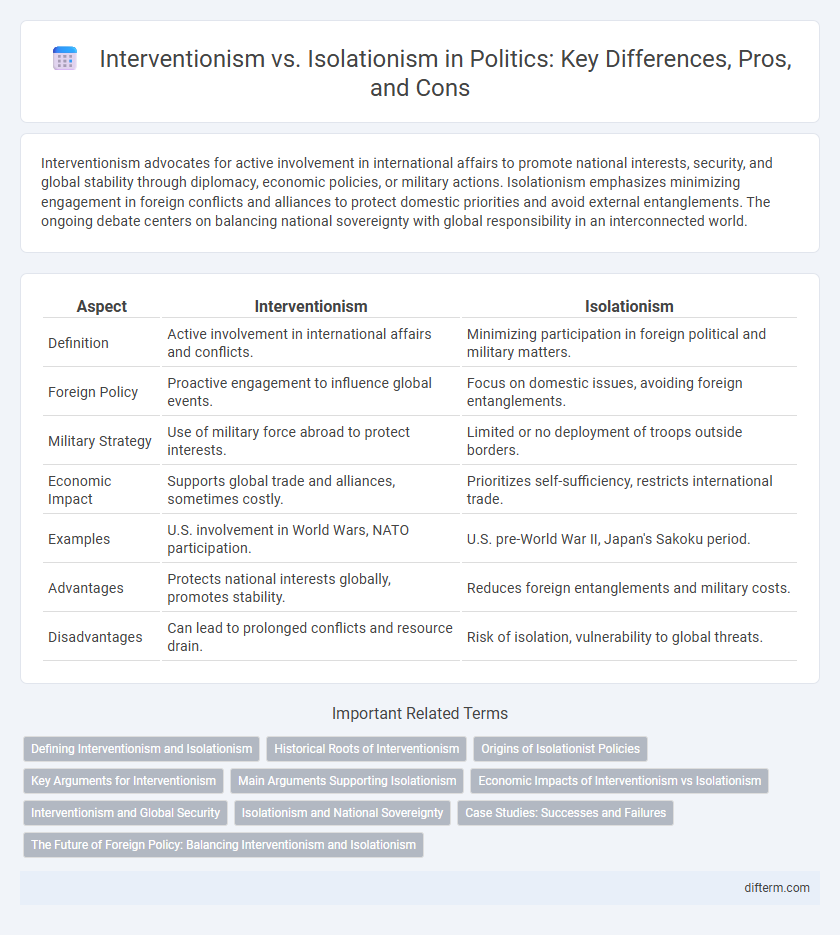Interventionism advocates for active involvement in international affairs to promote national interests, security, and global stability through diplomacy, economic policies, or military actions. Isolationism emphasizes minimizing engagement in foreign conflicts and alliances to protect domestic priorities and avoid external entanglements. The ongoing debate centers on balancing national sovereignty with global responsibility in an interconnected world.
Table of Comparison
| Aspect | Interventionism | Isolationism |
|---|---|---|
| Definition | Active involvement in international affairs and conflicts. | Minimizing participation in foreign political and military matters. |
| Foreign Policy | Proactive engagement to influence global events. | Focus on domestic issues, avoiding foreign entanglements. |
| Military Strategy | Use of military force abroad to protect interests. | Limited or no deployment of troops outside borders. |
| Economic Impact | Supports global trade and alliances, sometimes costly. | Prioritizes self-sufficiency, restricts international trade. |
| Examples | U.S. involvement in World Wars, NATO participation. | U.S. pre-World War II, Japan's Sakoku period. |
| Advantages | Protects national interests globally, promotes stability. | Reduces foreign entanglements and military costs. |
| Disadvantages | Can lead to prolonged conflicts and resource drain. | Risk of isolation, vulnerability to global threats. |
Defining Interventionism and Isolationism
Interventionism refers to a foreign policy approach where a nation actively engages in the political, economic, or military affairs of other countries to influence outcomes in favor of its strategic interests. Isolationism is characterized by a deliberate avoidance of alliances and conflicts abroad, emphasizing national sovereignty and minimizing involvement in international disputes. These contrasting policies shape a country's global role, impacting diplomacy, defense commitments, and economic relations.
Historical Roots of Interventionism
Interventionism traces its historical roots to the 19th-century European balance of power politics, where states frequently engaged in military and diplomatic actions to maintain stability and prevent hegemony. The Congress of Vienna in 1815 exemplifies early interventionist efforts to reorder Europe after the Napoleonic Wars. These precedents influenced later American and global interventionist policies during the World Wars and the Cold War, emphasizing proactive engagement to shape international order.
Origins of Isolationist Policies
Isolationist policies trace back to the early 20th century when the United States sought to avoid entanglement in European conflicts following World War I. Influenced by the widespread public disillusionment and the desire to prioritize domestic economic recovery, lawmakers enacted measures such as the Neutrality Acts of the 1930s to limit foreign military involvement. These origins reflect a strategic emphasis on national sovereignty and economic stability over international interventionism.
Key Arguments for Interventionism
Interventionism supports active involvement in global affairs to promote national security, protect economic interests, and uphold international stability. Proponents argue that strategic interventions can prevent conflicts, deter adversaries, and foster alliances that enhance global influence. Historical examples such as NATO interventions underscore the effectiveness of proactive policies in maintaining geopolitical balance.
Main Arguments Supporting Isolationism
Isolationism advocates emphasize the importance of limiting foreign entanglements to preserve national sovereignty and reduce military expenditures. By avoiding interventionist policies, countries can focus on domestic priorities such as economic growth and social welfare. Historical examples like the U.S. pre-World War II period illustrate how isolationism aims to prevent costly wars and minimize involvement in complex international conflicts.
Economic Impacts of Interventionism vs Isolationism
Interventionism often stimulates economic growth by promoting trade partnerships and foreign investments that open new markets and enhance resource access. Isolationism can protect domestic industries from international competition but risks limiting economic expansion and technological innovation due to reduced global engagement. Empirical data shows countries with moderate interventionist policies typically experience higher GDP growth and diversified economies compared to heavily isolationist nations.
Interventionism and Global Security
Interventionism plays a crucial role in maintaining global security by enabling proactive responses to international conflicts and humanitarian crises. It supports the establishment of multinational coalitions and peacekeeping missions that deter aggression and uphold international laws. States practicing interventionism often contribute significantly to collective security frameworks like the United Nations and NATO, reinforcing stability worldwide.
Isolationism and National Sovereignty
Isolationism emphasizes the protection of national sovereignty by minimizing foreign entanglements and avoiding international conflicts. This approach prioritizes self-governance, economic independence, and the preservation of cultural identity against external influences. Advocates argue that isolationism strengthens a nation's control over its own affairs, reducing risks associated with global alliances and military interventions.
Case Studies: Successes and Failures
The interventionist approach in Somalia during the early 1990s led to short-term stabilization but ultimately failed to establish long-term peace, revealing challenges in external military involvement. Conversely, Japan's post-World War II isolationist policies transformed into strategic interventionism, fostering economic growth and regional influence without extensive military conflict. These case studies illustrate that the balance between interventionism and isolationism hinges on contextual factors such as local governance, international support, and geopolitical interests.
The Future of Foreign Policy: Balancing Interventionism and Isolationism
The future of foreign policy hinges on striking a balance between interventionism, which advocates for proactive engagement in global conflicts and humanitarian efforts, and isolationism, which emphasizes prioritizing national sovereignty and minimizing foreign entanglements. Policymakers must weigh the benefits of strategic alliances and international cooperation against the risks of overextension and domestic backlash. Emerging challenges such as cyber warfare, climate change, and global pandemics demand a nuanced approach that integrates selective intervention with measured restraint to safeguard national interests and global stability.
interventionism vs isolationism Infographic

 difterm.com
difterm.com